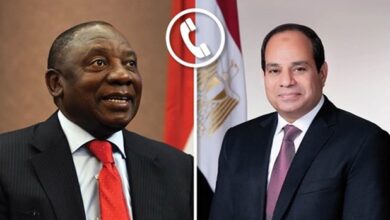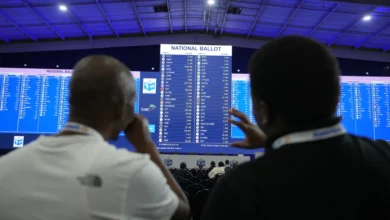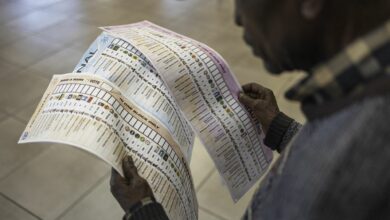South Africa’s parliament began debating a motion of no-confidence in the country’s president, Jacob Zuma, Tuesday in a vote that will test the loyalty of members of his party, the African National Congress (ANC).
The vote will take place in secret, leading to speculation that more ANC members of parliament will break party ranks and vote to oust their scandal-hit leader.
As head of the party that led South Africa out of apartheid, Zuma won the presidential election in 2009 and 2014, but has faced a number of no-confidence votes in the past and has been dogged by criminal investigations and corruption allegations.
More than 50 of the ANC’s 249 MPs would need to vote against the president in order for the no-confidence motion to pass.
“The choice before us is a simple one. Either we allow one family, aided and abetted by the president to take everything from us, or on behalf of the people of South Africa we take our country back,” said opposition leader Mmusi Maimane, leader of the Democratic Alliance party, in an emotional speech that opened the debate.
“This debate is about our integrity as the governing party,” said Doris Dlakude, Deputy Chief Whip of the ANC in the National Assembly.
She claimed the motion of no confidence was the work of an “insurrectionist opposition” whose main aim was to “sow seeds of chaos in society to ultimately grab power.”
“The inherent danger of such a practice, the potential to use money to influence politics and the electorate won’t know what they voted for,” she told the parliament. “We are not sellouts, we know who sent us here, we will vote ANC,” she said.
In Cape Town, thousands of protesters from the various opposition parties amassed near parliament where large television screens have been erected for them to watch the debate that precedes the vote. Zuma’s supporters were also planning to march.
There was a heavy police presence with some in riot gear and equipped with razor wire in case of violence.
According to the South African constitution, if he loses the vote, President Zuma and his entire cabinet would have to step down, and the speaker of parliament would take up the presidency for 30 days.
Parliamentary speaker Baleka Mbete decided to make the vote private after an opposition party took the case to the Constitutional Court.
Former South African President, Thabo Mbeki, said the secret ballot should encourage lawmakers to “vote truthfully, and without fear that maybe the party, in this case the ANC, might punish them if they vote in support of the motion of no confidence.”
“What all of us hope is that they will vote honestly, because you know the opinion in the country about what’s been happening and the politics of South Africa. I think those MPs must recall that they are the representatives of the people, and must therefore represent the people in terms of what they do this afternoon,” said Mbeki.
Last year, the Constitutional Court ordered Zuma to repay
millions of dollars in public funds spent on refurbishing his private homestead. The polygamist and father of more than 20 children also
faces more than 783 allegations of corruption relating to a 1990s arms deal.
Zuma, 75, denies the corruption allegations against him. And despite street protests,
opposition maneuvering, and defections from his own party, he refuses to step down.
In the past, the ANC has always managed to close ranks when faced with internal division, but a new spate of corruption allegations has severely tested Africa’s oldest liberation movement.
Zuma and his closest supporters
already stand accused of having questionable links with the Guptas — a wealthy expat Indian family with vast business interests in South Africa — after an official report by the former public protector, an anti-corruption watchdog, found evidence of possible government corruption and recommended an official inquiry.
Zuma and the Guptas denied the allegations in last year’s report.
But a recent
leak of more than 200,000 emails suggests corruption on a far wider scale — implicating cabinet members, state-owned industry executives, and members of Zuma’s own family.
“There are real concerns that the president and those closest to him have undermined those institutions, that they have captured those institutions and they have effectively paralyzed them so that they are too scared to act,” said Susan Comrie, an investigative journalist with AmaBhungane, the non-profit group that exposed the emails.
“Once you start digging and you start investigating, you don’t really know where it’s going to end,” Comrie added.
Zuma has denied a corrupt relationship with the Guptas from the beginning; he called for the emails’ veracity to be investigated by an inquiry, but has yet to launch one.
Through their lawyer, the Guptas have called the emails “fake news.”
The ANC has welcomed an inquiry into the allegations by the new public protector.
Even with a secret ballot, the vote of no-confidence could be a long shot.
ANC politicians are already looking to a future without Zuma, whose term ends in 2019. The party will meet in December to choose his successor. Many in the ANC would rather dictate their own future than be led by opposition groups.
But several powerful ANC members, like former finance minister
Pravin Gordhan — who was controversially sacked by Zuma earlier this year — have called on MPs to vote their conscience.
As the economy struggles, the party
suffered substantial electoral losses in the last nationwide election.




